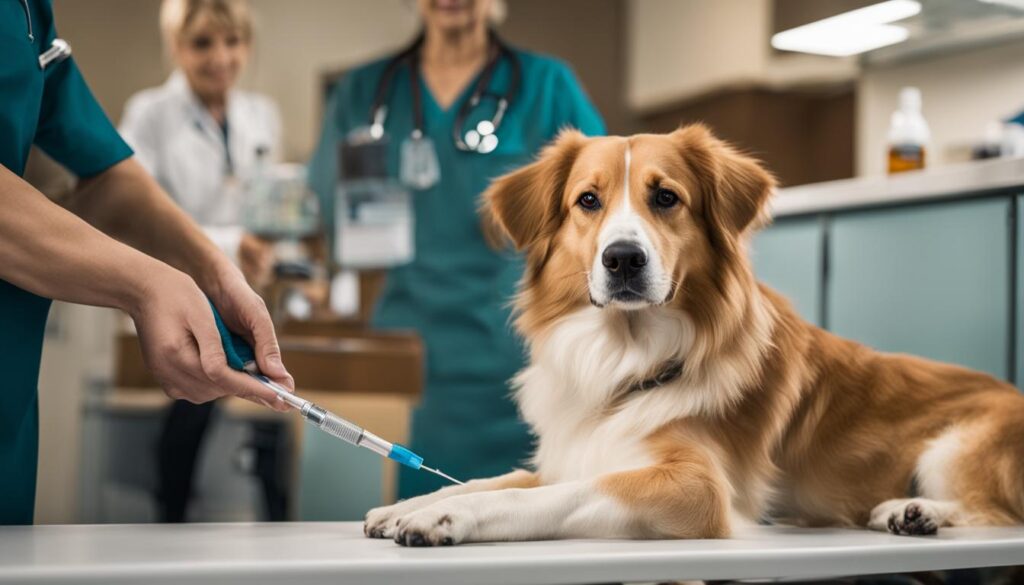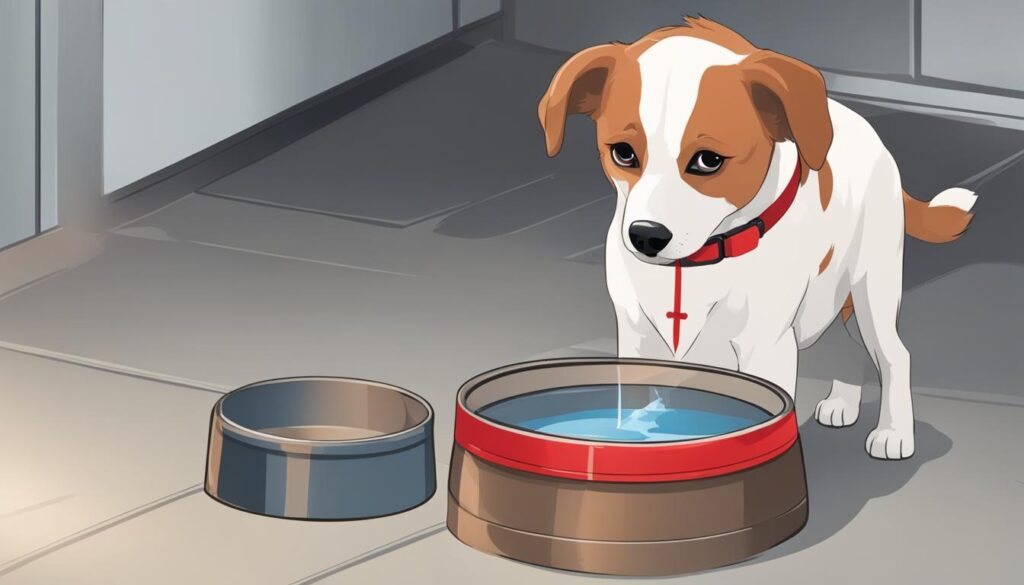As a dog owner, it’s important to be aware of your furry friend’s health and well-being. One of the common health concerns that dogs experience is urinary tract infections (UTIs). Canine urinary tract infections can be painful and uncomfortable for your pet, which is why it’s essential to understand the symptoms and treatments.
Dogs of any age, breed, or gender can develop UTIs. However, some factors can increase the likelihood of your pet developing a urinary tract infection. These include being a female dog, advanced age, and a weakened immune system.
If you suspect that your dog may have a urinary tract infection, it’s crucial to seek veterinary care promptly. Early detection and treatment can help prevent the infection from worsening and causing further complications.
Key Takeaways
- Urinary tract infections can affect dogs of any age, breed, or gender.
- Female dogs, older dogs, and those with a weakened immune system are at a higher risk of developing UTIs.
- Early detection and treatment are essential in preventing UTIs from escalating and causing further complications.
Recognizing the Signs of Urinary Tract Infections in Dogs
If your dog is experiencing discomfort while urinating or showing unusual behavior around their potty breaks, they might be suffering from a urinary tract infection (UTI). Canine UTIs are a common condition that affects dogs of all ages and breeds. Knowing the signs of UTIs in dogs will help you take early action and seek appropriate care.
The following are some of the most common signs of UTIs in dogs:
- Blood in the urine or discolored urine
- Frequent urination
- Inability to urinate or straining to urinate
- Excessive licking of the genital area
- Loss of appetite
- Vomiting
- Lethargy
If you observe one or more of these symptoms in your dog, take them to a veterinarian for a proper diagnosis and treatment.
Expert Tip: One of the easiest ways to recognize signs of UTIs in dogs is to keep track of their urination habits. Any changes in frequency, odor, or appearance could be a warning sign.


It is important to note that UTIs in dogs can also be asymptomatic, meaning they do not show any visible symptoms. In such cases, routine checkups with your veterinarian become even more important.
Now that you know the signs of UTIs in dogs, let’s move on to the preventive measures you can take to reduce the risk of this condition.
Preventing Urinary Tract Infections in Dogs
If you want to keep your pup healthy and happy, it’s important to take measures to prevent urinary tract infections (UTIs). Here are some tips to help you prevent UTIs in your dog:
Maintain Good Urinary Health
Keeping your dog hydrated is one of the most significant things you can do to maintain good urinary health. Encourage your dog to drink plenty of water throughout the day, and make sure to provide them with fresh water at all times. Additionally, it’s important to ensure that your dog’s diet includes plenty of moisture-rich foods. Consult with your veterinarian to ensure that your dog’s diet is appropriate for their age, breed, and activity level.
Take Frequent Bathroom Breaks
Encourage your dog to take frequent bathroom breaks. Make sure they get plenty of time outside to urinate and defecate. If your dog is prone to UTIs, you may need to take them outside more frequently than usual. Keep an eye on their behavior and pay attention to any signs that they might need to use the bathroom.
Maintain Proper Hygiene
Maintaining proper hygiene is another essential aspect of preventing UTIs in dogs. Always clean your dog’s genital area after they use the bathroom to prevent the accumulation of bacteria. Additionally, keep their bedding and living area clean and regularly wash any toys or blankets they come into contact with.
Use Natural Remedies
Some natural remedies can promote good urinary health and help prevent UTIs in dogs. For example, cranberry supplements can help prevent the growth of harmful bacteria in the urinary tract. Consult with your veterinarian to determine which natural remedies are safe and effective for your dog.
Consider Probiotics
Probiotics can help promote a healthy balance of bacteria in your dog’s gut, which can reduce the risk of UTIs. Consider adding a probiotic supplement to your dog’s diet to support their overall urinary health.
Regular Veterinary Check-ups
Regular check-ups with your veterinarian can help you catch potential UTIs before they become more severe. Your vet will be able to check your dog’s urine for signs of infection and recommend treatment options if necessary.


Diagnosing Urinary Tract Infections in Dogs
If you suspect your dog has a urinary tract infection, it is crucial to seek veterinary care promptly. Your veterinarian will perform a variety of diagnostic tests to confirm the infection and rule out other underlying conditions.
Physical Exam
Your veterinarian will perform a thorough physical exam of your dog to check for signs of pain, discomfort, or inflammation in the urinary tract. They may also palpate your dog’s bladder to assess its size and firmness.
Urinalysis
A urinalysis is a commonly used diagnostic tool to detect the presence of bacteria, blood, or white blood cells in the urine. Your veterinarian may collect a sample of your dog’s urine for analysis and use a dipstick or microscope to examine it.
Urine Culture
In some cases, your veterinarian may recommend a urine culture to determine the specific type of bacteria causing the infection and the most effective antibiotics to treat it. This involves collecting a urine sample and sending it to a laboratory for analysis.
Imaging Studies
In more severe cases or when other underlying conditions are suspected, your veterinarian may recommend imaging studies such as X-rays or ultrasound to assess the urinary tract’s anatomy and function.


Note: It is crucial to follow your veterinarian’s recommendations for diagnostic testing to ensure an accurate diagnosis and appropriate treatment plan for your dog’s urinary tract infection.
Treating Urinary Tract Infections in Dogs
If your dog has been diagnosed with a urinary tract infection (UTI), it is important to take immediate action to help your pet recover. Antibiotics are usually prescribed by veterinarians to treat canine UTIs. These medications work by targeting and eliminating the bacteria causing the infection.
Note: It is crucial to follow the dosage instructions provided by your veterinarian carefully. Administering too much or too little of the medication can cause adverse effects and hinder the healing process.
In addition to administering antibiotics, you can provide your dog with additional care measures to help alleviate their discomfort and support their recovery. Here are some ways to help your furry friend:
- Ensure they have access to plenty of fresh water to encourage urination and flush out bacteria
- Monitor their urination and bowel movements to ensure they are urinating regularly
- Provide a low-stress environment for them to rest and recover
- Spay or neuter your dog to reduce the risk of future UTIs
It is also important to schedule a follow-up appointment with your veterinarian to monitor your dog’s progress and ensure the infection has been fully treated. In some cases, additional testing or a more extended course of antibiotics may be necessary.
Remember, the sooner you seek treatment for your dog’s UTI, the better their chances of a full and speedy recovery.


“It is important to seek immediate treatment for your dog’s UTI to ensure a full and speedy recovery.”
Natural Remedies for Urinary Tract Infections in Dogs
If your dog is suffering from a urinary tract infection, there are several natural remedies that can help alleviate symptoms and promote healing. While these remedies can be used alongside traditional medical treatments, it’s important to consult with your veterinarian first.
Cranberry Supplements
Cranberry supplements are a popular natural remedy for urinary tract infections in dogs. Cranberries contain compounds that prevent bacteria from adhering to the bladder walls, making it harder for infections to take hold. You can find cranberry supplements in tablet or powder form at most pet stores, and they can be added to your dog’s food for easy administration.
Apple Cider Vinegar
Apple cider vinegar is another popular natural remedy for urinary tract infections in dogs. It works by creating an acidic environment in the bladder that is inhospitable to bacteria. To use apple cider vinegar, add a teaspoon to your dog’s water bowl or mix it with their food.
Herbal Supplements
Several herbal supplements can also be beneficial for dogs with urinary tract infections. These include uva ursi, goldenseal, and Oregon grape. These herbs have antimicrobial properties and can help soothe inflammation in the urinary tract. However, it’s important to consult with a holistic veterinarian before using any herbal remedies.
Probiotics
Probiotics are beneficial bacteria that support a healthy digestive system. They can also be helpful for dogs with urinary tract infections, as they promote a healthy balance of bacteria in the gut and urinary tract. You can find probiotic supplements designed specifically for dogs at most pet stores.
Increased Water Intake
One of the most important steps you can take to support your dog’s recovery from a urinary tract infection is to encourage them to drink plenty of water. This helps flush out bacteria from the urinary tract and promotes overall urinary health. You can add water to your dog’s food, provide multiple water bowls throughout your home, or even flavor their water with low-sodium broth or bone broth.
Supporting Your Dog’s Recovery and Ongoing Urinary Tract Health
Recovery from a urinary tract infection in your dog can take time and may require ongoing care to prevent future infections. Here are some tips for supporting your dog’s recovery and promoting long-term urinary tract health:
Dietary Changes
Consider changing your dog’s diet to a high-quality, grain-free food that supports urinary health. Look for foods that are high in moisture content and low in magnesium and phosphorus. Consult with your veterinarian to determine the best diet for your dog’s specific needs.
Increased Hydration
Encourage your dog to drink plenty of water to help flush out bacteria and prevent dehydration. Consider adding water to your dog’s food or offering them bone broth to increase their fluid intake.
Natural Remedies
There are several natural remedies that can support your dog’s urinary tract health, such as cranberry supplements or D-mannose supplements. These supplements can help prevent bacteria from adhering to the bladder wall and causing infections. However, always consult with your veterinarian before giving your dog any new supplements.
Regular Vet Visits
Regular check-ups with your veterinarian can help detect any urinary tract issues early on and prevent them from becoming more serious. Your vet can also monitor your dog’s overall health and make recommendations for ongoing care and preventive measures.
Cleanliness
Keeping your dog’s genital area clean and trimmed can help prevent the buildup of bacteria and reduce the risk of infection. Be sure to regularly wash your dog’s bedding and clean their food and water bowls to prevent the spread of bacteria.
Exercise
Regular exercise can help keep your dog’s urinary tract healthy by promoting good circulation and flushing out bacteria. Make sure your dog gets plenty of exercise each day, but avoid over-exertion, which can lead to dehydration and other health issues.


Remember, prevention is key when it comes to urinary tract infections in dogs. By making simple lifestyle changes and paying attention to your dog’s urinary health, you can help prevent future infections and keep your furry friend happy and healthy.
Conclusion
Now that you have a better understanding of urinary tract infections in dogs, you can take proactive steps to prevent and manage this condition. Remember to keep an eye out for common symptoms such as frequent urination, discomfort while urinating, and cloudy or bloody urine. By maintaining good urinary health through regular exercise, proper hydration, and a balanced diet, you can help reduce the risk of UTIs in your furry friend.
Seeking Treatment
If you suspect your dog has a urinary tract infection, don’t hesitate to seek veterinary care. Early diagnosis and treatment are essential for a speedy recovery and to prevent the infection from spreading to the kidneys or bladder. Your veterinarian may prescribe antibiotics or other medications, as well as recommend additional care measures to support your dog’s healing process.
Preventing Future UTIs
One of the best ways to prevent urinary tract infections in dogs is to promote good urinary health. This includes providing plenty of opportunities for your dog to urinate, encouraging regular exercise, and feeding a diet that is rich in essential nutrients and moisture. Drinking plenty of water is also crucial for maintaining a healthy urinary system.
Another way to support your dog’s urinary health is by incorporating natural remedies such as cranberry supplements or herbal supplements. These can be used alongside traditional treatments to promote overall well-being and prevent future UTIs.
Overall Health and Wellness
Remember, taking care of your dog’s urinary tract health is just one aspect of their overall wellbeing. Be sure to provide plenty of love, attention, and regular veterinary care to help keep your furry friend happy and healthy for years to come.
FAQ
What are the common signs of urinary tract infections in dogs?
Common signs of urinary tract infections in dogs include frequent urination, difficulty urinating, blood in the urine, strong odor in the urine, and accidents in the house.
How can I recognize the signs of urinary tract infections in dogs?
You can recognize signs of urinary tract infections in dogs by observing their behavior and checking for symptoms such as increased frequency of urination, straining or discomfort while urinating, and changes in the color or smell of their urine.
What can I do to prevent urinary tract infections in dogs?
To prevent urinary tract infections in dogs, ensure they have access to fresh and clean water, encourage regular bathroom breaks, maintain good hygiene by keeping the genital area clean, and consider feeding them a balanced diet that promotes urinary health.
How are urinary tract infections in dogs diagnosed?
Veterinarians diagnose urinary tract infections in dogs through a combination of physical examination, urine analysis, and sometimes additional tests such as urine culture or ultrasound.
How are urinary tract infections in dogs treated?
Urinary tract infections in dogs are typically treated with antibiotics prescribed by a veterinarian. In addition to medication, it is important to ensure your dog has plenty of water, take them out for frequent bathroom breaks, and provide supportive care as recommended by the veterinarian.
Are there natural remedies available for urinary tract infections in dogs?
Yes, there are natural remedies and alternative treatments available for urinary tract infections in dogs. These can include cranberry supplements, herbal remedies, and specialized diets that support urinary health. However, it is important to consult with a veterinarian before trying any natural remedies.
How can I support my dog’s recovery from a urinary tract infection?
To support your dog’s recovery from a urinary tract infection, make sure they complete the full course of antibiotics as prescribed by the veterinarian, provide plenty of water for hydration, maintain good hygiene, and follow any additional recommendations provided by the veterinarian for ongoing urinary tract health.
Why is it important to understand urinary tract infections in dogs?
Understanding urinary tract infections in dogs is important because it allows you to recognize the signs early, take preventive measures, and seek appropriate treatment. Prompt diagnosis and treatment can help prevent complications and ensure your dog’s overall health and well-being.

